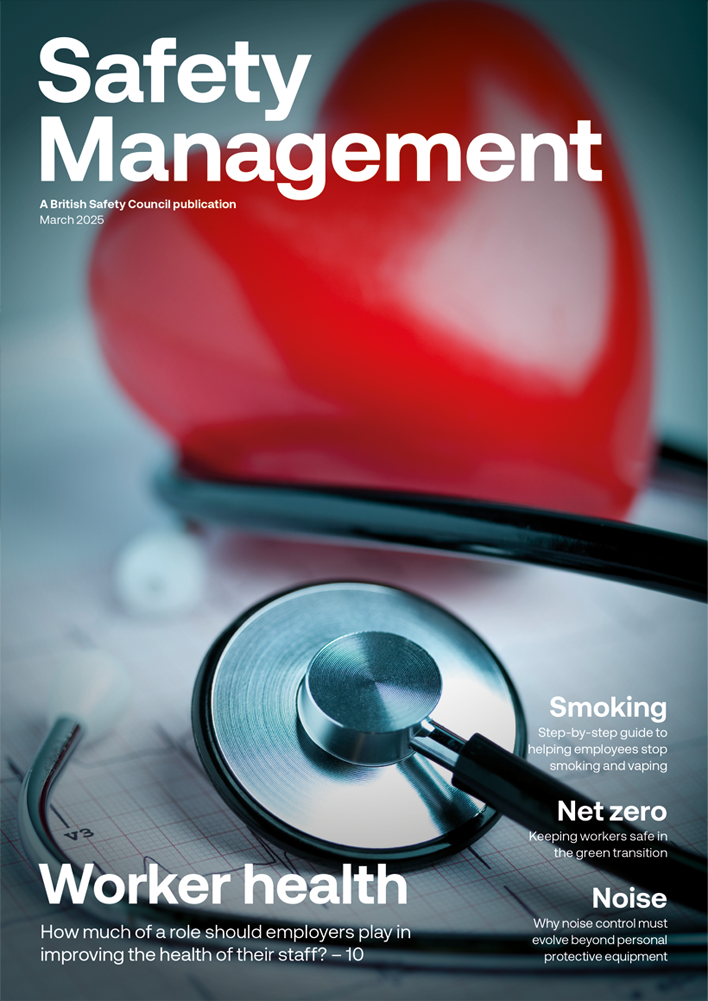Opinion
Directors in the dock – why health and safety leadership is crucial
The role that directors, senior managers and officers play in the implementation and management of their organisation’s health and safety policies and procedures should never be underestimated.
It has been widely accepted that an organisation cannot achieve high levels of health and safety management without the participation of its directors and senior management.
In particular, directors who do not show leadership in health and safety are likely to be considered to be failing in their duty as directors and their moral duty, and in all likelihood damaging their organisation.

Natalie Walker, senior associate, Pinsent Masons LLP.
The board of an organisation are expected to take overarching responsibility for health and safety in their organisation. This is not to say that they are responsible for the ‘nuts and bolts’ of health and safety within their organisation, but they are expected to be able to satisfy themselves that the key elements of their organisation’s health and safety policies and procedures are being applied in practice. Members of the board have both collective and individual responsibility for health and safety in their organisation.
The importance of this role and the potential repercussions that directors, officers or managers could face if it is not fulfilled has been highlighted in a number of recent criminal prosecutions.
Conviction of nursery manager
One of these such cases was the recent conviction of a nursery manager following health and safety failings which led to the death of a toddler.
Miranda Anderson was the manager of a nursery in Edinburgh where a toddler choked to death on a piece of mango while in the nursery’s care in 2019. It was discovered that the incident occurred when the toddler had been left unsupervised for several minutes while a staff member went to the toilet. An investigation found that the employer, Bright Horizons Family Solutions Limited, had failed to provide their employees with suitable instruction and supervision to adequately control the risk of children choking during mealtimes. The investigation also found that there were a number of other occasions when staff were involved with other tasks and not watching the children eat.
The company was charged with various breaches of the Health and Safety at Work Act 1974 (‘the 1974 Act’). In January 2022, the company pled guilty to these charges and was fined £800,000. In sentencing the company the Sheriff commented that the company had had “systems in place” over the supervision of eating but they were “not sufficiently adhered to or implemented”.
Charges were also brought against Ms Anderson as a result of the duties that she had as nursery manager to oversee health and safety. She was found guilty of breaching these duties and it was held that the toddler’s death had been attributable to neglect on Ms Anderson’s part. Ms Anderson was fined £2,000 in October 2022 as a result.
Potential offences and repercussions
By virtue of section 37 of the 1974 Act, an individual director, company secretary or manager of a company can be held criminally responsible for a health and safety offence if the following two things apply:
- The company itself has been found guilty of a health and safety offence; and
- The offence was committed with the consent or connivance of, or was attributable to any neglect on the part of the director, manager, secretary or other similar officer of the company or a person who was purporting to act in any such capacity.
Consent, connivance and neglect can be described as follows:
- Consent – this is an awareness of what was going on and an agreement to it; for example, giving an instruction to do something that was unsafe.
- Connivance – this is an awareness that an unsafe activity was going on, but taking no steps to prevent it, essentially ‘turning a blind eye’.
- Neglect – this is where a director or manager fails to comply with a duty imposed upon him/her. As well as duties imposed by law this could also include an obligation imposed upon a manager or director by a contract of employment, health and safety policy and/or health and safety management system.
A director could also be held liable under section 36 of the 1974 Act where an organisation commits a health and safety offence due to an act or default of a director.
The potential implications for an individual convicted of these offences can be severe with a maximum penalty of up to two years’ imprisonment or an unlimited fine.
A director convicted under these sections could also face being disqualified from being a director for up to 15 years.
It is also important to note that in cases where there has been a fatality, a director could also find themselves facing a charge for gross negligence manslaughter where there has been a breach of a duty of care to the deceased and the breach can be said to be ‘gross’. This could be the situation where a director knows that a dangerous situation exists but then takes no steps to improve it.
Guidance for directors and senior managers
To assist directors in fulfilling these duties, the Institute of Directors and Health and Safety Executive (HSE) have published a guidance document called Leading Health and Safety at Work. This document contains a health and safety leadership checklist to assist directors in complying with health and safety legislation.
The guidance sets out three essential principles that directors should follow in order to achieve good health and safety management. These are (a) strong and active leadership from the top; (b) worker involvement; and (c) assessment and review.
The guidance also sets out a four-point agenda to ensure that the above principles are embedded into an organisation. These are to make sure that (a) the direction of health and safety is sufficiently planned; (b) that health and safety is adequately delivered in the organisation; (c) that health and safety is monitored; and (d) that health and safety is reviewed.
Within this agenda are core actions that should be taken by the board and practical information on how to put these core actions in place in an organisation. The core actions are intended to set a standard for how directors should manage health and safety in their organisation.
Other documents have been produced by HSE to assist directors and senior managers with meeting the duties imposed on them. The first of these is a document entitled Managing health and safety (HSG65). This seeks to give some guidance as to what good health and safety management involves and includes things such as ensuring that competent employees are carrying out tasks and that appropriate training and support is given to these employees.
Another document to be aware of is the now updated Turnbull Guidance on the Combined Code on Corporate Governance. Although this now revised document is geared towards listed companies, HSE has warned that where there is a workplace fatality HSE and the police will look to see whether or not the board of directors have conducted their business in a manner that is aligned and compliant with this guidance.
Conviction following asbestos management failures
The second case which demonstrates the potential implications for individuals following a health and safety breach is a case which involved the prosecution of two companies and a director following asbestos management failures.
A large quantity of asbestos-containing materials (ACMs), including asbestos insulating board, was identified during an inspection carried out by HSE at a factory in Kidderminster in February 2019. The premises were owned by Kespar Engineering Limited (‘Kespar’) and were occupied at the time by a company called SDF Automotive Limited (‘SDF’). The sole director of both companies was Peter Gerard Parkes.
An investigation carried out by HSE found the defendants had been aware that asbestos was present within their premises and had previously provided asbestos management plans – although these had not been reviewed or updated. The investigation also found that the location and condition of the asbestos on the site was not actively monitored and the risk of any exposure to ACMs was not adequately considered or controlled by the defendants.
Kespar pled guilty to breaching various regulations within the Control of Asbestos Regulations 2012 (‘COA Regs’) and was fined £51,000 in July 2022 and ordered to pay costs of £30,000.
SDF (now in administration) also pled guilty to breaching various regulations within the COA Regs and was conditionally discharged for two years.
Peter Parkes pled guilty to several counts under section 37 of the 1974 Act. He was given a 12-month prison sentence, fined £9,000 and ordered to pay costs of £14,000.
These two cases should serve as an important reminder of the crucial role that directors, officers and senior managers play in making sure that health and safety is effectively managed throughout their organisation. These individuals must ensure that suitable and robust policies and procedures are in place, that they are regularly reviewed and that they meet the particular risks of the business.
These cases are also a reflection of an emerging trend throughout the UK of regulators increasing considering also bringing charges against individuals for health and safety failures.
It is therefore essential that directors, officers and managers make sure that they understand and comply with their health and safety obligations. The repercussions of failing to do so could be tragic for all those concerned. As the saying goes, “with great power comes great responsibility”.
Natalie Walker is a senior associate at Pinsent Masons LLP. contact her at:
OPINION

Beyond compliance: why noise control must evolve beyond PPE
By Gill Cussons, Noise & Vibration Solutions on 13 March 2025
Engineering solutions for noise control on plant, machinery and tools are often straightforward, low-cost and bring financial savings themselves, so it’s time employers moved away from the default position of purchasing and issuing personal hearing protection to workers.

Navigating a changing world
By Mike Robinson FCA, British Safety Council on 03 March 2025
Human history has hung on a timeline of change and every generation has been asked to answer the same call, to adapt and evolve. From the printing press to the PC, change has continuously re-defined both the work we do and how we do it. Where the future differs from the past is the pace at which change will impact society.

Noise-induced hearing loss: time to make it personal?
By Neal Hill, UKHCA on 28 February 2025
This year, the Health and Safety Executive (HSE) celebrated its 50th anniversary, a milestone in its long-standing mission to protect lives and improve workplace safety. 2025 is also the 20th anniversary of the Control of Noise at Work Regulations (2005). It’s also now a year since I wrote an opinion piece for Safety Management arguing that we need to harness new technology to prevent noise-induced hearing loss (NIHL).¹ So, what has happened in the meantime?



